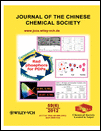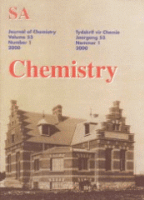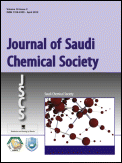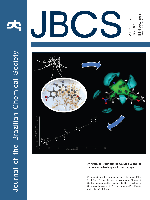
Eurasian Journal of Chemistry
Scope & Guideline
Unveiling the Future of Chemistry Together
Introduction
Aims and Scopes
- Polymer Chemistry:
Research on the synthesis, characterization, and application of various polymers, including biodegradable and functionalized polymers for biomedical and environmental applications. - Nanotechnology:
Exploration of nanomaterials and their applications, including the synthesis of nanoparticles, nanocomposites, and their use in drug delivery, catalysis, and environmental remediation. - Catalysis and Reaction Engineering:
Investigation of catalytic processes, including the development of new catalysts and reaction conditions for the conversion of biomass and other feedstocks. - Green Chemistry:
Focus on environmentally friendly synthesis methods, including green synthesis techniques and the development of sustainable materials. - Analytical Chemistry:
Development and application of various analytical techniques for the quantification and characterization of chemical substances, including HPLC and spectroscopic methods. - Interdisciplinary Research:
Integration of chemistry with other scientific domains such as biology, materials science, and environmental science to address complex scientific problems.
Trending and Emerging
- Biomedical Applications of Polymers:
There is an increasing focus on the development of polymers for biomedical applications, including drug delivery systems and tissue engineering, highlighting the interaction between chemistry and health. - Sustainable and Green Chemistry Practices:
Emerging themes include sustainable synthesis methods and environmentally friendly materials, reflecting a broader trend towards sustainability in chemical research. - Nanoparticle Synthesis and Applications:
The synthesis and characterization of nanoparticles for various applications, including catalysis and environmental remediation, are gaining traction, showcasing advancements in nanotechnology. - Catalytic Processes for Biomass Conversion:
Research on catalytic processes aimed at converting biomass into valuable chemicals is becoming more prominent, addressing the need for renewable resources and sustainable practices. - Advanced Analytical Techniques:
The use of sophisticated analytical methods, such as HPTLC and DFT studies, is on the rise, indicating a trend towards more precise and comprehensive characterization of chemical compounds.
Declining or Waning
- Classical Organic Synthesis:
There is a noticeable decrease in the publication of traditional organic synthesis methods, as the focus shifts towards more innovative and efficient synthetic techniques. - Theoretical Studies without Experimental Validation:
The journal has seen fewer purely theoretical papers that do not include practical applications or experimental validation, indicating a trend towards more applied research. - Basic Inorganic Chemistry:
Research focused solely on fundamental inorganic chemistry appears to be less frequent, with a growing emphasis on applications in materials science and catalysis. - Chemical Education Research:
Papers focusing on chemical education and pedagogical methods have become less prominent, possibly due to a greater emphasis on research with direct industrial or practical applications.
Similar Journals

RSC Advances
Catalyzing Innovation Through Open Access ResearchRSC Advances, published by the Royal Society of Chemistry, is a leading open-access journal that has been a prominent platform for cutting-edge research since its inception in 2011. Recognized globally for its rigorous peer-review process, RSC Advances serves the dynamic fields of Chemical Engineering and Chemistry, holding prestigious rankings within the top quartile of academic journals in both areas. With its impact factor reflecting a growing influence, the journal currently occupies the Q1 category in Chemical Engineering and Q2 in Chemistry as of 2023. Researchers and professionals will find RSC Advances an essential resource for innovative studies and applications that advance scientific knowledge. Additionally, as an open access journal since 2017, it affords wider visibility and accessibility to groundbreaking research, fostering collaboration and engagement in the scientific community. Situated in Cambridge, UK, RSC Advances remains committed to its objective of disseminating high-quality research that catalyzes progress across various disciplines.

RUSSIAN JOURNAL OF APPLIED CHEMISTRY
Transforming Ideas into Innovative Solutions in ChemistryRUSSIAN JOURNAL OF APPLIED CHEMISTRY, published by PLEIADES PUBLISHING INC, serves as a pivotal platform for advancing knowledge in the fields of chemical engineering and general chemistry. With an ISSN of 1070-4272 and an E-ISSN of 1608-3296, this journal has been in continuous publication since 1995 and is set to continue until 2024. Although it operates without an open access model, researchers can access a wealth of innovative research findings, critical reviews, and insightful discussions that reflect the current trends and challenges in applied chemistry. Its rankings place it in Q3 quartiles for both Chemical Engineering and Chemistry as of 2023, indicating its emerging influence within these disciplines. The Scopus rankings further highlight its relevance, positioning it in the lower percentiles, suggesting a fertile ground for researchers aiming to elevate the field. Engaging with this journal can enrich academic and professional understanding, making it an essential resource for anyone dedicated to furthering their expertise in applied chemistry.

JOURNAL OF THE CHINESE CHEMICAL SOCIETY
Navigating the Landscape of Chemical AdvancementsJOURNAL OF THE CHINESE CHEMICAL SOCIETY, published by WILEY-V C H VERLAG GMBH, is a vital resource in the field of chemistry, focusing on a broad array of topics pertinent to general chemistry and its advancing sub-disciplines. Established in 1954 and running through 2024, this journal serves as a significant platform for the dissemination of high-quality research, showcasing innovative findings and developments within the chemical sciences. With its Q3 category ranking and positioning at Rank #203 in General Chemistry per Scopus, it reflects the journal's commitment to research excellence and impact. While not an open-access publication, it ensures accessibility to a global audience, making it an essential tool for researchers, professionals, and students alike seeking to stay informed and engaged in the evolving landscape of chemistry.

SOUTH AFRICAN JOURNAL OF CHEMISTRY-SUID-AFRIKAANSE TYDSKRIF VIR CHEMIE
Catalyzing Change in the World of ChemistrySouth African Journal of Chemistry (Suid-Afrikaanse Tydskrif vir Chemie), published by Bureau Scientific Publications, is a pivotal open-access journal that has been disseminating groundbreaking research in the field of chemistry since its inception in 1996. With an ISSN of 0379-4350 and an E-ISSN of 1996-840X, this journal serves as a vital platform for researchers and professionals seeking to share their work and engage with the global chemistry community. Recognized for its significant contributions, the journal holds a Q3 quartile ranking in the miscellaneous chemistry category as of 2023 and ranks #216 out of 408 in General Chemistry according to Scopus. The South African Journal of Chemistry is dedicated to advancing knowledge in the discipline by publishing a wide array of articles, reviews, and studies that address pertinent chemical research and applications. With open access options available since 2000, it fosters a collaborative environment, ensuring that research is accessible to all, thereby enhancing the visibility and impact of chemists' work across South Africa and beyond.

Vietnam Journal of Chemistry
Exploring the Frontiers of Chemical ScienceVietnam Journal of Chemistry, published by WILEY, is a prominent academic journal that serves as a platform for the dissemination of innovative research in the field of chemistry. With its ISSN 0866-7144 and E-ISSN 2572-8288, this journal has made a significant impact on the global scientific community, evidenced by its 2023 Scopus ranking as #274 in the General Chemistry category and a commendable percentile of 32nd. The journal, categorized in the Q3 quartile for miscellaneous chemistry subjects, aims to foster communication among chemists from Vietnam and around the world, encouraging collaboration and the exchange of cutting-edge knowledge. While it currently does not offer Open Access options, the Vietnam Journal of Chemistry is committed to contributing valuable insights from its coverage years spanning from 2018 to 2024, making it a worthy resource for researchers, professionals, and students dedicated to advancing the field of chemistry. Based in the United Kingdom, it stands as a testament to the vibrant research endeavors emerging from Vietnam and beyond.

Journal of Saudi Chemical Society
Leading the Charge in Cutting-edge Chemical Discoveries.The Journal of Saudi Chemical Society, published by ELSEVIER, stands as a premier platform for advancing knowledge in the field of chemistry. Since its inception in 2009, this Open Access journal has garnered significant attention, securing a prestigious Q1 ranking in the Chemistry (miscellaneous) category for 2023, reflecting its position among the top journals in the discipline. With an impressive Scopus ranking of #66 out of 408 in General Chemistry, this journal boasts a commendable 83rd percentile, underscoring its impact and relevance in the global research community. The journal aims to disseminate high-quality research articles, reviews, and case studies, fostering innovation and collaboration among chemists and allied professionals. By enabling widespread access to cutting-edge research, the Journal of Saudi Chemical Society plays a crucial role in supporting the educational and professional development of students, researchers, and practitioners alike, making it an essential resource for anyone invested in the dynamic field of chemistry.

JOURNAL OF THE INDIAN CHEMICAL SOCIETY
Illuminating India's Contributions to Global Chemical ResearchJournal of the Indian Chemical Society, published by Elsevier, stands as a cornerstone in the field of chemistry, particularly representing the rich chemical research emanating from India.
With a significant history dating back to its establishment, this journal encompasses diverse disciplines including Drug Discovery, Electrochemistry, Inorganic Chemistry, Organic Chemistry, and Physical and Theoretical Chemistry, reflecting the evolving landscape of chemical sciences.
Despite being positioned in the Q3 category across multiple quarters, the journal demonstrates promising rankings in various chemistries, highlighting its commitment to advancing the knowledge and application of chemical sciences. While currently not available as an open access journal, the Journal of the Indian Chemical Society is dedicated to providing a platform for high-quality research that fosters innovation and collaboration among researchers, professionals, and students worldwide.
With its continuous publication from 1973 to the present, it serves as an essential repository for cutting-edge findings and developments in chemistry, striving to connect academia with industry and practice.

RUSSIAN CHEMICAL BULLETIN
Unveiling the Future of Chemistry, One Bulletin at a Time.RUSSIAN CHEMICAL BULLETIN, published by SPRINGER, serves as a pivotal resource in the field of general chemistry, covering a wide array of topics that impact both theoretical and applied chemistry. With an ISSN of 1066-5285 and a presence since 1993, this journal provides a platform for disseminating significant research findings, practical applications, and novel methodologies within the broader chemistry community. While it currently holds a Q3 ranking in the Chemistry (miscellaneous) category and occupies the 230th position out of 408 in the Scopus rankings, its reputation continues to grow, fostering collaboration and innovation among researchers and professionals alike. Although the journal does not offer an open-access model, it is committed to making findings accessible within the academic community, ensuring that valuable insights can inform future research. With an anticipated convergence of studies extending to 2024, the RUSSIAN CHEMICAL BULLETIN remains an essential reference for those dedicated to advancing chemical science.

Ovidius University Annals of Chemistry
Fostering Global Collaboration in Chemistry.Ovidius University Annals of Chemistry is a prominent open-access journal dedicated to the field of chemistry and chemical engineering, published by OVIDIUS UNIV PRESS since 2012. With its ISSN 1583-2430 and E-ISSN 2286-038X, this journal seeks to foster innovative research and disseminate knowledge across diverse chemical disciplines. Situated in the vibrant academic setting of Ovidius University in Constanta, Romania, this journal receives contributions from a global pool of researchers, enhancing its relevance in the international scientific community. The open-access format ensures that all published articles are freely available, promoting a wider reach and impact of the research dissemination. As a valued resource for academics, industry professionals, and students alike, the Ovidius University Annals of Chemistry plays a crucial role in advancing the understanding of chemical sciences and engineering practices.

JOURNAL OF THE BRAZILIAN CHEMICAL SOCIETY
Driving Discovery: The Voice of Brazilian Chemical ScienceThe Journal of the Brazilian Chemical Society (ISSN: 0103-5053; E-ISSN: 1678-4790), published by the Sociedade Brasileira de Química, stands as a prominent outlet for disseminating high-quality research in the field of chemistry. Since its establishment as an Open Access journal in 1990, it has been committed to providing unrestricted access to innovative findings and discussions that propel the advancement of chemical sciences globally. Located in the vibrant research landscape of Brazil, this journal aims to showcase a wide range of topics including analytical, organic, inorganic, and physical chemistry, among others, catering to a diverse audience of researchers, professionals, and students alike. The journal holds a noteworthy distinction with a Q3 quartile ranking in the field of miscellaneous chemistry for 2023 and is indexed in Scopus, reflecting its growing influence in the academic community. With a publication cycle that spans continuously from 1990 through 2024, it serves as a vital resource for anyone seeking to stay informed about the latest trends and breakthroughs in chemistry.